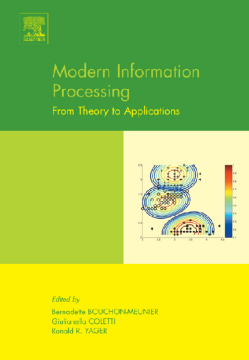
BOOK
Modern Information Processing
Bernadette Bouchon-Meunier | Giulianella Coletti | Ronald R. Yager
(2011)
Additional Information
Book Details
Abstract
The volume "Modern Information Processing: From Theory to Applications," edited by Bernadette Bouchon-Meunier, Giulianella Coletti and Ronald Yager, is a collection of carefully selected papers drawn from the program of IPMU'04, which was held in Perugia, Italy.
The book represents the cultural policy of IPMU conference which is not focused on narrow range of methodologies, but on the contrary welcomes all the theories for the management of uncertainty and aggregation of information in intelligent systems, providing a medium for the exchange of ideas between theoreticians and practitioners in these and related areas.
The book is composed by 7 sections:
UNCERTAINTY
PREFERENCES
CLASSIFICATION AND DATA MINING
AGGREGATION AND MULTI-CRITERIA DECISION MAKING
KNOWLEDGE REPRESENTATION
•The book contributes to enhancement of our ability to deal effectively with uncertainty in all of its manifestations.
•The book can help to build brigs among theories and methods methods for the management of uncertainty.
•The book addresses issues which have a position of centrality in our information-centric world.
•The book presents interesting results devoted to representing knowledge: the goal is to capture the subtlety of human knowledge (richness) and to allow computer manipulation (formalization).
•The book contributes to the goal: an efficient use of the information for a good decision strategy.
APPLIED DOMAINS
· The book contributes to enhancement of our ability to deal effectively with uncertainty in all of its manifestations.
· The book can help to build brigs among theories and methods methods for the management of uncertainty.
· The book addresses issues which have a position of centrality in our information-centric world.
· The book presents interesting results devoted to representing knowledge: the goal is to capture the subtlety of human knowledge (richness) and to allow computer manipulation (formalization).
· The book contributes to the goal: an efficient use of the information for a good decision strategy.
